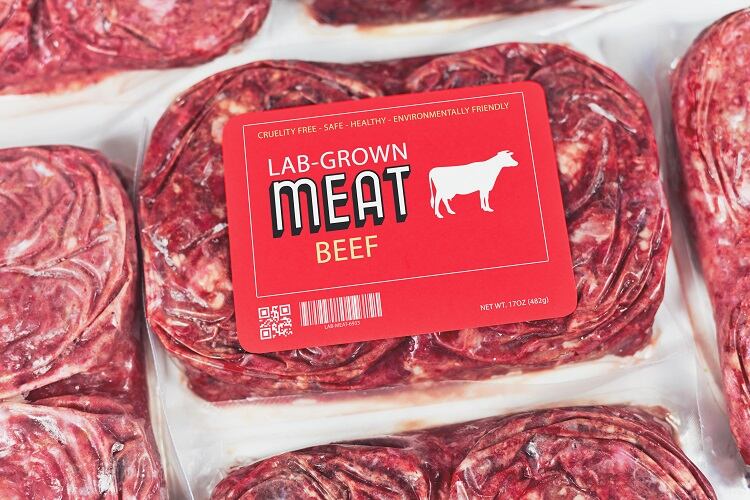Cultivated meat by itself can’t solve all the UK’s climate- and land use-related problems.
However, in a new report, Boston Consulting Group and cultivated meat start-up Ivy Farm Technologies argue the technology can make a ‘real’ contribution to the effort.
The European Environment Agency estimates that compared to traditionally produced European beef, for example, cultivated meat uses 45% less energy. When produced with renewable energy (which it is hoped is on the horizon), it can emit up to 92% less greenhouse gas emissions, use 95% less land, and 78% less water compared to traditional beef.
Using less land is also associated with reduced deforestation related to livestock farming, which is also beneficial for nature-based carbon capture. Further, as there is no manure, the risk of pollutants leaking into surface or groundwater is ‘non-existent’.
Boston Consulting Group (BCG) and Ivy Farm Technologies, who published the Bringing the Benefits of Cultivated Meat to the UK report today, acknowledge that cell-based meat must be a widely available, preferred choice among consumers if it is to reach its full potential.
How can stakeholders help ensures its success?
Regulation must reflect fast-paced innovation
As it stands, just one cultivated meat product has received market authorisation: Eat Just’s cultivated chicken ingredient in Singapore.
The UK can take inspiration from Singapore, suggest BCG and Ivy Farm. “The first step is for the UK government to support the introduction of cultivated meat technology and the Food Standards Agency (FSA) to approve its safety.”
Changes to the FSA’s Novel Foods Regulatory Framework will be ‘essential’ in kickstarting the cultivated meat industry, they stress. The framework should reflect the ‘pace of innovation’ in the sector.
“Advances in this field are happening quickly: by the time a company receives approval for their cultivated meat product, the technology might have moved to a new level – with new considerations and requirements.
“By establishing a suitable approach to regulation that takes into account the rapid pace of innovation, the burden on both industry and regulator can be reduced.”
Getting farmers onside
UK farmers must accept the cultivated meat industry if the sector is to gain government support and consumer acceptance, believe BCG and Ivy Farm.
Notably, conventional farmers need to be convinced that their livelihoods wont’ be affected, especially those working in small-to-medium size operations. “Ensuring the survival of these farms will be essential in building public and governmental support for cultivated meat.”
How can industry get farmers on board? To start with, the report authors stress it is ‘critical’ that farmers understand the cultivated meat rollout. It is likely, believe BCG and Ivy Farm, that the first cultivated meat products will be minced meat – in which case, consumers will continue to demand high-quality cuts of meat such as steaks.
“Promoting cultivated meat as a way to reduce the country’s dependence on imported meat would also likely ease farmers’ concerns.”
Investing in price parity
Cultivated meat production will not become economically viable overnight: the report authors predict price parity will be achieved with meat ‘sometime in the 2030s’.
To get there, investment in R&D to improve unit economics is required. “The manufacturing process must optimise the calorific value of the inputs required with the calorific value of the final cultivated meat product.
“In addition, the cost of the medium in which the cells are grown must decline and the economics of the bioreactors used must improve.”
All this will require ‘major’ R&D efforts, believe BCG and Ivy Farm, which in turn will require ‘significant’ investment by large funds and key players ranging from CPGs to bioreactor manufacturers, and retailers.
To encourage investment, cultivated meat producers must be able to demonstrate that the ‘hoped-for returns’ for investors are real.
The UK government can also play a role, suggest the report authors, by providing incentives to investors and offer the industry further tax credits for R&D.
Making cultivated meat a ‘default’ menu option
Cultivated meat must hit the mark on price, taste, and texture to achieve widespread consumer acceptance. Consumers must also get their heads around eating meat grown in a bioreactor, rather than a field.
All of this, BCG and Ivy Farm stress, require ‘significant’ effort from all stakeholders.
CPGs, retailers, and restaurants can help by including the development and promotion of cultivated meat products in their ESG goals and product strategies. “Consumers must be able to understand what cultivated meat is, how it is made and its health and environmental benefits; trust is essential to engender support.”
Of course, no single company will likely have the financial or operational capabilities to make all this happen. BCG and Ivy Farm are calling for cross-industry collaboration in the form of a consortium.
“A consortium made up of influential players in the UK that concentrates even more specifically on cultivated meat can play a critical role in the speedy development of this essential addition to our future diets.”
UK needs to take a leaf out of US, Israel, Singapore’s book
The report was welcomed by alternative protein proponent the Good Food Institute (GFI).
According to Seth Roberts, policy manager at GFI, the findings produce ‘yet more’ evidence of the environmental, public health and economic benefits cultivated meat could bring to the UK. Roberts hopes it will be ‘closely’ studied by businesses and policymakers.
“With its scientific expertise and entrepreneurial spirit, the UK is well-placed to become a global leader in cultivated meat, but for that to happen the government needs to follow the lead of other countries such as the US, Israel and Singapore, which are taking this issue more seriously, by boosting critical investment in research and development.”
Roberts continued: The government also needs to set up a sustainable protein strategy to ensure the UK capitalises on the benefits of these new foods, and create a strong and transparent regulatory environment which encourages innovation while providing consumers with the confidence they need.”




